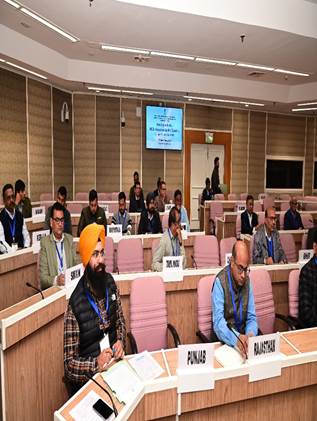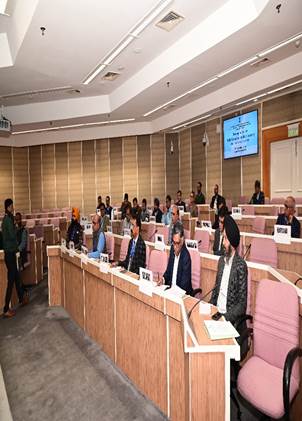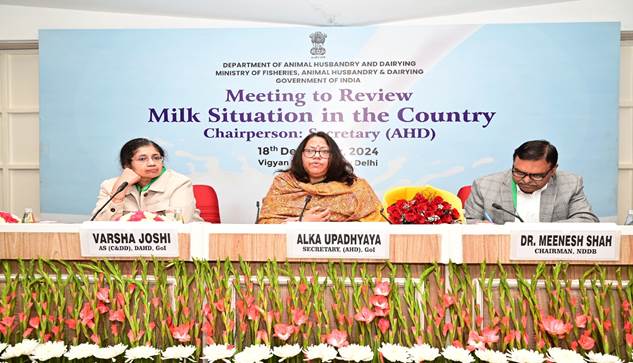Over 27,000 Household Biogas Plants Installed across 19 States; 1,040 Farmers Earned 11,000 Carbon CreditsIndia’s Milk Market Stable with Low Inflation Rates in November 2024; Dairy Federations Urged to Boost Participation in Midday Meal and ICDS Programs for Greater Impact
A meeting to review the Milk Situation in the country was held under the Chairpersonship of Smt. Alka Upadhyaya, Secretary, Department of Animal Husbandry & Dairying (DAHD), Ministry of Fisheries, Animal Husbandry and Dairying on 18th December 2024 in New Delhi. The meeting was attended by representatives from National Dairy Development Board (NDDB), and National Cooperative Dairy Federation of India (NCDFI) along with officials of DAHD and State Cooperative Dairy Federations and Milk Unions across the country. The milk situation in the country and the progress being made by the State Milk Federations were discussed in detail during the review.
Secretary (DAHD), Smt. Alka Upadhyaya emphasized that India holds the top position globally in milk production, generating approximately 239.3 million metric tons in the year 2023-24. She emphasized that Dairy Federations should focus on enhancing milk procurement and increasing the price paid to the farmers, while also considering consumer interests. Secretary DAHD said that the overall milk situation in the country is stable and the Wholesale Price Index (WPI) & Consumer Price Index (CPI) with the year-on-year inflation rates for milk recorded at 2.09 and 2.85 respectively for November 2024. There is an adequate commodity stock of Skimmed Milk Powder, Whole Milk Powder, White Butter, and Ghee. At the same time, there has been an improvement in milk procurement and milk procurement prices over the year. Secretary (DAHD) advised all Milk Federations to take up active participation in the Midday Meal and Integrated Child Development Services (ICDS) programs of the Ministry of Women and Child Development (MoWCD) and the Ministry of Human Resource Development (MoHRD), as these represent the largest institutional domestic market for the dairy sector. During the meeting, the initiatives undertaken by the State Milk Federations such as Amul (Gujarat), Nandini (Karnataka), Saras (Rajasthan), and Megha (Jharkhand) were commended, and it was recommended that other Federations should undertake similar efforts. DAHD is also consistently collaborating with MoWCD and MoHRD to promote the inclusion of milk in the Midday Meal and ICDS programs. It was observed that commensurate to the production, consumption of processed dairy has increased by 20%. A detailed discussion was held concerning the strategies and initiatives required to further enhance the processing of milk to value-added products and accordingly, detailed presentations were made by NDDB which also offered support to the states for evaluating projects under the National Programme for Dairy Development, particularly in light of evolving consumer preferences for packaged milk and value-added offerings.
During the review, a presentation on Circular Economy was made by NDDB highlighting the interventions made in the area with respect to the dairy sector. In its presentation, the National Dairy Development Board demonstrated three models of bio gas generation namely the Zakariyapura Model (The Household level biogas-based Manure Value Chain model), the Banaskantha Model (Dung based large capacity biogas plant to produce Bio CBG and Organic Fertilizer) and the Varanasi Model (Dung based large capacity biogas plant to suffice Steam and Power needs of Dairy Plant). These biogas plants are giving a boost to the circular economy by promoting sustainable green fuel energy and producing organic fertilizers. Till date more than 27,000 household biogas plants have been installed in 19 states across the country under various schemes/ CSR initiatives/ through NDDB support etc . Two large capacity dung based CNG/Biogas plants with a total capacity of 140 MT/Day of dung are already operationalised and another 11 plants having a combined capacity of 675 MT/Day are under various stages of being taken up.


Further the Household biogas initiative has also helped in generating carbon credits for the Dairy cooperative sector. Under first such initiative, a total of 11,000 carbon credits have been earned by 1,040 farmers, giving boost to both farmer incomes and contributing to the aim of achieving circular economy. It was also informed that NDDB has entered into an MOU with Suzuki R&D Centre India Pvt Ltd (An affiliate of Suzuki Motor Corporation). The major objective of the MOU is to jointly design, develop, implement and scale up innovative business models to efficiently utilize cow dung as a source of energy for fuelling transportation needs and as a rich source of organic fertilizer while achieving carbon neutrality.
Secretary, DAHD advised the dairy federations to work on circular economy in the dairy sector and be proactively involved in getting the benefits in consultation with NDDB. She stated that during the Department’s upcoming conference on circularity in the Dairy sector, every State should come up with at least one project on Biogas to join the circularity movement. This will help in reducing the carbon footprint of the dairy sector and at the same time also help in enhancing income of Dairy Farmers. The discussion also included the use of water within the dairy value chain and approaches to ensure its efficient utilization. It was pointed out that the integration of automation could lead to a considerable reduction in water consumption at processing plants, thereby aiding the efforts of the National Water Mission and the National Action Plan on Climate Change.
Secretary DAHD concluded the meeting with remarks on the need of benchmarking in the dairy industry for bringing efficiency, reducing cost of production and the carbon footprint of the industry. The milk federations were also directed to speed up formation of cooperative societies to enhance milk procurement and bring more milk in the organized sector in order to improve the social and economic status of milk producers in India.
****





